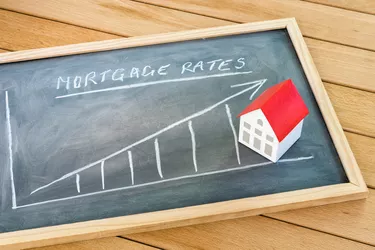
Home prices have been increasing by double-digit percentages for 25 weeks. Last week, the Federal Reserve's (Fed) 0.75-point interest rate increase was a move that priced many potential homebuyers out of the market. As lenders charge higher mortgage interest rates, will the Fed's rate hike drive competition down and cause home prices to drop?
Inflation, Interest Rates and the Housing Market
Video of the Day
The pandemic and related issues caused housing prices to soar. Increased demand for single-family housing, rising costs of materials and disruptions to the supply chain only stoked the fire.
Video of the Day
It was the basic supply and demand model. As the housing supply in the market dwindled, consistently increasing demand for houses created intense competition among potential homeowners and pushed housing prices higher.
The rising price of shelter contributed to inflation. The Brookings Institution explains that although the selling prices of homes aren't figured into the consumer price index (CPI), the cost of acquiring (or "consuming") shelter is. The May 2022 CPI is up to 8.6 percentage points over the same time last year. The main components of this increase are shelter, gasoline and food.
The rising cost of shelter is due to home price increases and rising rents. The median home price in the first quarter of 2019 was $313,000. By Q1 of 2022, the median price reached $428,700 – an increase of more than 31 percent.
Low interest rates kept the housing market hot. Throughout 2020 and 2021, many repeat and first-time homebuyers took the plunge despite record home price growth because low interest rates kept monthly mortgage payments manageable.
To curb consumer demand and reduce inflation, the Fed has increased short-term interest rates three times this year. And this is impacting the long-term interest rates of the mortgage market and automotive industry.
Higher interest rates will drive many potential home buyers out of the race, slimming down the intense competition of the past two years.
How Fed Hikes Impact Mortgage Rates
The Fed sets the federal funds rate as a benchmark interest rate that U.S. banks charge each other for overnight lending to meet reserve requirements. In short, a federal rate hike makes it more expensive for banks to borrow money – and they often pass that increased cost onto borrowers. This is the third rate increase by the Fed in 2022.
So, while the rising rates from the Fed don't directly lift mortgage interest rates for home loans, they are a big reason why the bank will charge new homeowners more for a 30-year mortgage.
According to the most recent housing market update by Realtor.com, the typical buyer can expect to pay a monthly mortgage payment that is 39 percent higher today than a year ago. And it may get tougher for home buyers to secure a mortgage. The Mortgage Bankers Association reported a decrease in mortgage credit supply for the third month in a row, indicating that lending standards are getting tighter.
Where Is the Housing Market Headed?
The shrinking affordability of new homes has the housing market and mortgage markets preparing for impact as Americans feel the pinch of higher mortgage interest rates on top of high home prices and record-high inflation.
After last week's announcement by the Fed, Doug Duncan, chief economist for Fannie Mae, predicted a slowdown in home sales and a decrease in refinance activity in the coming months.
At the same time, the Mortgage Bankers Association reported a 5 percent decrease in mortgage applications due to high mortgage rates and "dampen(ing) demand."
In a statement following the Fed's recent announcement, Lawrence Yun, chief economist of the National Association of Realtors (NAR), predicted that higher mortgage rates will put the brakes on the housing market and slim down the buyer pool. Redfin's latest housing market update predicts a shrinking pool of homeowners and a slowdown in the housing sales boom.
According to a recent U.S. Home Price Insights report by CoreLogic, the Fed's strike at curbing consumer demand may cool down home buyers and cause price declines in some markets.
While rising rates are causing the most significant changes to the housing market, the monthly supply of new houses is on the increase and the active inventory of available real estate is slowly growing, too. For sellers and buyers alike, depending on the local real estate market, this may mean that bidding wars are no longer a sure thing as demand decreases and supply starts to increase.
What This Means for Home Buyers
Higher interest rates will drive many potential home buyers out of the race, slimming down the intense competition of the past two years. But it has yet to be seen if sale prices of homes will drop significantly enough to offset rising mortgage rates.
The Fed's rate hike is intended to slow down inflation and may eventually balance out the housing market. But rising interest rates can result in the growth rate of the economy overall, affecting employment and causing the country to fall into an economic downturn or recession.
Relief for home prices may be on the horizon, but the rebalancing may take a while. Knowing whether it is a good time to buy is a matter of personal finances and situation. In any economy, the wisest move is to speak to a financial advisor to understand how a home purchase might impact you today – and tomorrow.
- U.S. Department of Housing and Urban Development
- Homeownership Assistance: Illinois
- The Federal Reserve
- The New York Fed: Global Supply Chain Pressure Index (GSCPI)
- NPR: Who Are the Winners and Losers of the Fed Hiking Interest Rates?
- Brookings: How Does the Consumer Price Index Account for the Cost of Housing?
- St. Louis Fed: Median Sales Price of Houses Sold U.S.
- St. Louis Fed: Monthly Supply of New Houses in U.S.
- Realtor.com: New Residential Construction Slows as Rising Prices and Mortgage Rates Impact Demand
- Realtor.com: Weekly Housing Data